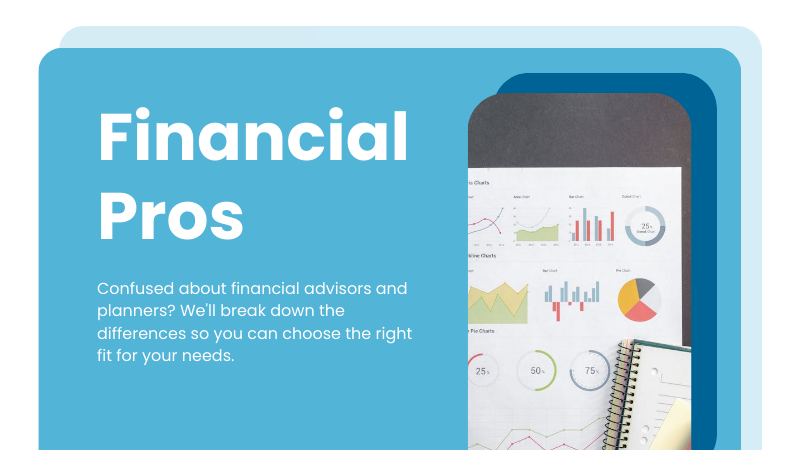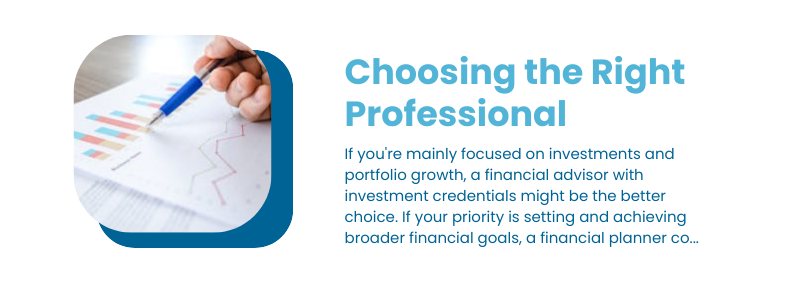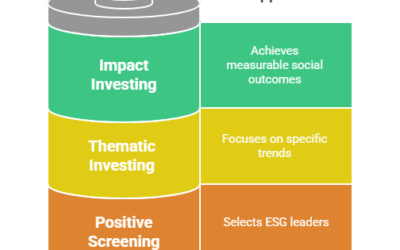Understanding your financial goals is one thing—figuring out who can help you achieve them is another. With terms like “financial advisor” and “financial planner” often used interchangeably, it’s no surprise that many people are confused about which professional they actually need. While both roles involve providing financial guidance, there are important distinctions that can impact your decision depending on your needs.
Whether you’re building a retirement strategy, managing investments, or planning for a child’s education, choosing the right expert is critical. This comprehensive guide breaks down the roles, responsibilities, credentials, and key differences between financial advisors and financial planners so you can confidently choose the right path.

What is a Financial Advisor?
A financial advisor is a general term for a professional who offers financial services and advice to clients. This includes a wide range of responsibilities, such as:
- Investment management
- Retirement planning
- Estate planning
- Insurance recommendations
- Tax minimization strategies
These professionals may be registered investment advisers (RIAs), brokers, or dual-registered professionals. Depending on their licensure and compensation structure, they may be paid by fees, commissions, or a combination of both.
Some financial advisors may specialize in high-net-worth individuals and focus on portfolio management, while others offer broad-based services. Because the term “financial advisor” is not tightly regulated, anyone offering financial advice can technically use it, so checking qualifications and credentials is crucial.
What is a Financial Planner?
A financial planner is a type of financial advisor who specializes in creating detailed, long-term financial strategies tailored to your goals. Their services often include:
- Comprehensive financial assessments
- Goal setting and budgeting
- Retirement forecasting
- College funding strategies
- Risk management and insurance analysis
- Estate and legacy planning
The most respected credential among financial planners is the Certified Financial Planner (CFP®) designation, which requires rigorous education, examinations, experience, and a fiduciary duty to act in the client’s best interest.
While financial advisors might focus more on investing and asset growth, financial planners are more holistic, providing a blueprint that touches every aspect of your financial life.
Key Differences Between Financial Advisors and Financial Planners
| Feature | Financial Advisor | Financial Planner |
| Scope of Work | Broad; includes investments, insurance | Holistic financial strategy |
| Common Credentials | CFA, ChFC, Series 7/66 | CFP®, CPA/PFS |
| Primary Services | Investment advice, wealth management | Long-term goal planning, budgeting |
| Compensation Models | Commission, fee-only, fee-based | Usually fee-only or flat-rate |
| Regulatory Oversight | SEC, FINRA, state agencies | SEC, CFP Board, state regulators |
Credentials and Certifications
Understanding certifications helps you determine the depth of expertise a professional brings to the table.
Common credentials for financial advisors include:
- CFA (Chartered Financial Analyst): Highly regarded in investment management.
- ChFC (Chartered Financial Consultant): Focuses on comprehensive planning but less recognized than CFP.
- Series 7/66 Licenses: Allow the sale of investment products; regulated by FINRA.
Common financial planner certifications:
- CFP (Certified Financial Planner): The gold standard for planning professionals, requiring fiduciary responsibility.
- CPA (Certified Public Accountant) with a PFS (Personal Financial Specialist): Ideal for those with complex tax needs.
Regulation and Fiduciary Duty
Financial advisors are typically regulated by the SEC or FINRA, depending on whether they work as brokers or investment advisers. Brokers are required to meet a “suitability” standard—meaning their advice must suit your needs but may not be the best option available.
In contrast, CFP-certified financial planners are bound by a fiduciary duty. They must act in your best interest at all times, providing recommendations that align with your goals, not their compensation.
This distinction alone makes a strong case for working with fiduciaries, especially for those seeking unbiased, long-term guidance.
Compensation Structures
How a financial professional gets paid can affect the type and quality of advice you receive.
Financial advisors might be:
- Commission-based: Paid through product sales like mutual funds, annuities, or insurance.
- Fee-only: Charge clients directly, often as a percentage of assets under management (AUM), a flat fee, or hourly.
- Fee-based: A mix of commission and client-paid fees.
Financial planners, particularly CFPs, tend to favor fee-only or flat-rate models. This reduces potential conflicts of interest and fosters a more trust-based relationship.
Choosing the Right Professional for Your Needs
The decision comes down to your financial objectives:
- If you’re seeking investment management or want help optimizing a portfolio, a financial advisor with investment credentials like a CFA may be the better choice.
- If your needs involve budgeting, setting long-term goals, or developing a complete life plan, a certified financial planner can offer more holistic support.
No matter which you choose, always ask these key questions:
- Are you a fiduciary?
- How are you compensated?
- What certifications do you hold?
- What services do you offer?
- Can you provide client references?
What to Avoid When Hiring a Financial Professional
Not all advisors or planners are created equal. Here are red flags to watch out for:
- Vague or unclear compensation structures
- Lack of fiduciary responsibility
- Heavy push toward proprietary or commission-heavy products
- Pressure to act quickly without proper explanation
- No third-party credentials or limited disclosure on background
You can verify credentials and check disciplinary history using:
- FINRA’s BrokerCheck
- The CFP Board’s verification tool
- The SEC’s Investment Adviser Public Disclosure database
Coming up next: we’ll conclude the article with how to make your final decision and link internally to related content on investment strategy, retirement planning, and choosing a financial professional.
How to Make the Final Decision
Choosing between a financial advisor and a financial planner isn’t about which is better—it’s about which one aligns best with your financial goals.
If you’re primarily focused on investments and portfolio growth, and need someone to help manage those assets actively, a financial advisor with deep investment expertise could be ideal. On the other hand, if your priority is setting and achieving broader financial goals—like paying off debt, saving for a home, or creating a retirement income strategy—a financial planner is likely a better fit.
It’s also worth noting that some professionals are both financial advisors and certified financial planners. These hybrid professionals offer the best of both worlds—investment acumen and strategic planning.
Consider your timeline, complexity of your finances, life goals, and your comfort level with financial concepts. Then, match that with a professional whose services, credentials, and compensation model align with your preferences.
Don’t hesitate to interview multiple professionals. A good financial relationship is built on trust, transparency, and a shared vision for your future.
Maximizing Value from Your Financial Professional
Once you’ve chosen your advisor or planner, stay engaged. The best outcomes come from collaboration. Here’s how to get the most value:
- Schedule regular check-ins to review your financial plan and adjust goals.
- Keep your advisor informed of life changes like new jobs, marriages, or inheritances.
- Be open and honest about your risk tolerance and financial habits.
- Don’t be afraid to ask questions—your advisor or planner works for you.
Internal and External Resources to Deepen Your Knowledge
To learn more about structuring a strong internal link strategy that mirrors the transparency and alignment expected from financial professionals, explore our comprehensive post on internal linking for SEO. This guide outlines the foundational elements of building trust and structure—principles that are just as important in content strategy as they are in financial planning.
Additionally, if you’re interested in creating a long-term savings strategy, see our guide on retirement planning techniques that financial planners commonly use to ensure you’re on track for the future.
For more insights into investment management, check out our breakdown of risk tolerance and asset allocation, a staple conversation topic with any skilled financial advisor.
Financial Advisor vs Financial Planner: What’s the Difference and Which Do You Need?
The terms “financial advisor” and “financial planner” may often be used interchangeably, but they serve different needs, offer different services, and follow different ethical standards. Whether you need investment advice, a detailed financial plan, or both, understanding these distinctions helps you make an informed, confident choice.
In a financial world filled with jargon and options, clarity is power. Equip yourself with the right knowledge, ask the right questions, and partner with a professional who truly supports your financial vision.







